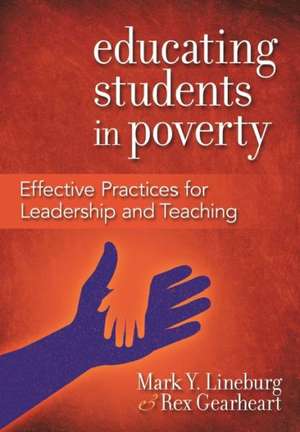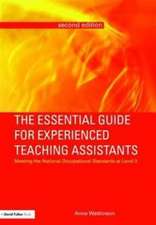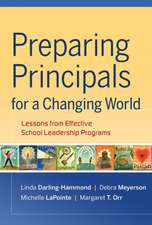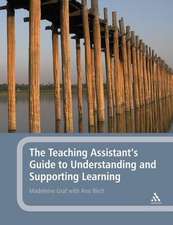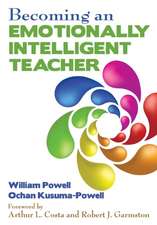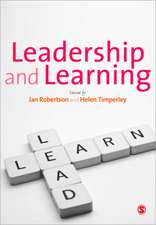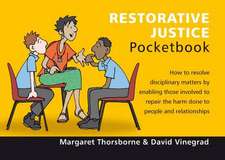Educating Students in Poverty: Effective Practices for Leadership and Teaching
Autor Mark Lineburg, Rex Gearhearten Limba Engleză Paperback – 30 apr 2013
Written for preK–12 teachers, leaders, and staff, Educating Students in Poverty provides essential strategies to help socioeconomically disadvantaged students achieve academic and lifelong success. Backed up with firsthand experiences and relevant research, these proactive instructional and administrative approaches cover a variety of topics, including:
- Advocating for underprivileged students
- Improving school climate and culture
- Engaging and communicating with families
- Instructional techniques and discipline issues
- Student health and safety
| Toate formatele și edițiile | Preț | Express |
|---|---|---|
| Paperback (1) | 274.02 lei 43-57 zile | |
| Taylor & Francis – 30 apr 2013 | 274.02 lei 43-57 zile | |
| Hardback (1) | 782.44 lei 43-57 zile | |
| Taylor & Francis – 24 noi 2015 | 782.44 lei 43-57 zile |
Preț: 274.02 lei
Nou
Puncte Express: 411
Preț estimativ în valută:
52.45€ • 56.99$ • 44.09£
52.45€ • 56.99$ • 44.09£
Carte tipărită la comandă
Livrare economică 21 aprilie-05 mai
Preluare comenzi: 021 569.72.76
Specificații
ISBN-13: 9781596672505
ISBN-10: 1596672501
Pagini: 208
Dimensiuni: 178 x 254 x 15 mm
Greutate: 0.36 kg
Ediția:1
Editura: Taylor & Francis
Colecția Routledge
Locul publicării:Oxford, United Kingdom
ISBN-10: 1596672501
Pagini: 208
Dimensiuni: 178 x 254 x 15 mm
Greutate: 0.36 kg
Ediția:1
Editura: Taylor & Francis
Colecția Routledge
Locul publicării:Oxford, United Kingdom
Public țintă
Professional Practice & DevelopmentRecenzii
"Educating Students in Poverty by Lineburg and Gearheart is a practical text that explores the reality of working with students in poverty. This is a powerful book that provides straightforward and realistic strategies for working with this complex situation. Administrators, teachers, and aspiring school leaders can use this book to better understand how to assist students of poverty and their families, as well as to engage and mobilize external stakeholders to support efforts to meet the diverse needs of students with low-income backgrounds." —Karen L, Sanzo, Associate Professor & Program Coordinator, Old Dominion University
"Dr. Mark Lineburg is the consummate professional and he has a firm and authentic grasp of the need for an equity framework in school communities. On the one hand, Mark and Rex Gearhart convey the gripping reality that poverty in schools is truly a factor associated with an opportunity gap. On the other hand, they clearly establish the refreshing and inspiring notion of hope in how school communities can make a difference for students and families. I wholeheartedly recommend Educating Students in Poverty to all teachers, educational researchers, educational leaders and anyone who works in school communities!" —Dr. Brian C. Ratliff, Division Superintendent, Washington County Public Schools
"Mark Lineberg and Rex Gearhart's Educating Students in Poverty provides educators with a practical guide on improving the academic achievement and support for our high need student population. Most of all, it describes the importance of meeting basic student needs so that they can be successful in the classroom. I highly recommend this book for the classroom, school, or central office." —Thomas Brewster, Ed.D., Superintendent of Schools, Pulaski County Public Schools
"Mark Lineburg and Rex Gearhart's Educating Students in Poverty from my perspective should be used as a tool to educate students. If we want to close the achievement gap, we should look at it's causes. This book lays a good foundation for that. Mark and Rex take it to the next level by providing us with some tangible solutions. I applaud Mark and Rex, two educators, who see what poverty is doing to our children, and have the courage to do something about it. Educating Students in Poverty is an easy read, and very informative." —Pynke Gohaner-Lyles, former Diversity Trainer and Consultant, Charlottesville, Virginia
"Dr. Mark Lineburg is the consummate professional and he has a firm and authentic grasp of the need for an equity framework in school communities. On the one hand, Mark and Rex Gearhart convey the gripping reality that poverty in schools is truly a factor associated with an opportunity gap. On the other hand, they clearly establish the refreshing and inspiring notion of hope in how school communities can make a difference for students and families. I wholeheartedly recommend Educating Students in Poverty to all teachers, educational researchers, educational leaders and anyone who works in school communities!" —Dr. Brian C. Ratliff, Division Superintendent, Washington County Public Schools
"Mark Lineberg and Rex Gearhart's Educating Students in Poverty provides educators with a practical guide on improving the academic achievement and support for our high need student population. Most of all, it describes the importance of meeting basic student needs so that they can be successful in the classroom. I highly recommend this book for the classroom, school, or central office." —Thomas Brewster, Ed.D., Superintendent of Schools, Pulaski County Public Schools
"Mark Lineburg and Rex Gearhart's Educating Students in Poverty from my perspective should be used as a tool to educate students. If we want to close the achievement gap, we should look at it's causes. This book lays a good foundation for that. Mark and Rex take it to the next level by providing us with some tangible solutions. I applaud Mark and Rex, two educators, who see what poverty is doing to our children, and have the courage to do something about it. Educating Students in Poverty is an easy read, and very informative." —Pynke Gohaner-Lyles, former Diversity Trainer and Consultant, Charlottesville, Virginia
Cuprins
Chapter 1: Fundamentals of Schooling; Chapter 2: Family Engagement and Communication; Chapter 3: Preschool; Chapter 4: Instruction; Chapter 5: Attendance; Chapter 6: Student Behavior; Chapter 7: Nutrition and Movement; Chapter 8: Wraparound Services; Chapter 9: Extended School Days andSummer Opportunities; Chapter 10: Student Participation; Conclusion
